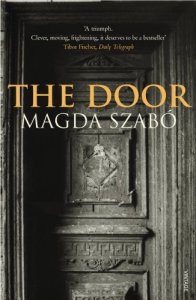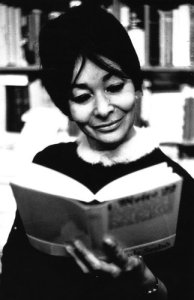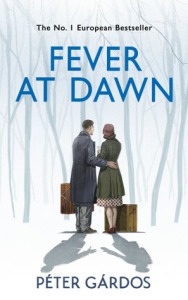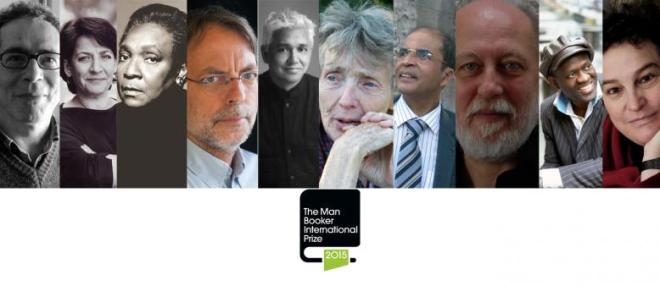 The Door is an overwrought, neurotic narrative by “the lady writer”, (possibly Szabó’s alter-ego, as there are similarities) describing her 20 year relationship with Emerence, the older lady who interviews her prospective employer to see if she’ll consider accepting the cleaning job on offer.
The Door is an overwrought, neurotic narrative by “the lady writer”, (possibly Szabó’s alter-ego, as there are similarities) describing her 20 year relationship with Emerence, the older lady who interviews her prospective employer to see if she’ll consider accepting the cleaning job on offer.
The writer and her husband have recently had a ban on publication lifted from them (for political reasons) and anticipate requiring help around the house as they get back to work. Despite having little respect for intellectuals and only for those who do manual work, in her own time Emerence decides to accept them.
No formal agreement dictated the number of hours Emerence spent in our house, or the precise times of her arrival. We might conceivably see nothing of her all day. Then, at eleven at night, she would appear, not in the inner rooms, but in the kitchen or the pantry, which she would scrub until dawn.
Are they dependent on one another or do they despise each other? Is Emerence an altruistic soul, or a cunning manipulator? Is the lady writer narcissistic or consumed with guilt pursuing her idle occupation while the older woman takes on more and more work?
I stood there gazing after her, wondering why she still stuck with me when I was so very different from her. I had no idea what she liked about me. I said earlier that I still rather young, and I hadn’t thought it through, how irrational, how unpredictable is the attraction between people, how fatal its current. And yet I was well versed in Greek literature, which portrayed nothing but the passions: death and love and friendship, their hands joined together around a glittering axe.
The entire novel hovers with each event between opposing emotional states as they appear to get the measure of the other only for the behaviour to completely change. Emerence will do anything and everything for everyone, she is loved by all, but has never opened the door to her home to a soul, her charges make it to her porch and no further. No one knows anything about her private life and she shuts down anyone who dares to pry.
Later, only very much later, in one of the most surreal moments I have ever experienced, I wandered amidst the ruin of Emerence’s life, and discovered, there in her garden, standing on the lawn, the faceless dressmaker’s dummy designed for my mother’s exquisite figure. Just before they sprinkled it with petrol and set fire to it, I caught sight of Emerence’s ikonstasis. We were all there, pinned to the fabric over the dolls’ ribcage: the Grossman family, my husband, Viola, the Lieutenant Colonel, the nephew, the baker, the lawyer’s son, and herself, the young Emerence, with radiant golden hair, in her maid’s uniform and little crested cap, holding a baby in her arms.
Seen through the prism of the writer, we observe Emerence only through her eyes, often confused, sometimes suspicious, frequently neurotic. She bears the hallmarks of an unreliable narrator.
It is a slow developing relationship and narrative that entwines these two women’s lives together, creating a delicate trust, the implications of which lead to its tragic denouement.
It’s a compelling, unsettling read, there is a sense of foreboding as the protagonist often jumps forward and provides brief glimpses as to what is coming, building tension and the sense of some kind of catastrophic event or revelation that awaits them all.
 Magda Szabó was born in 1917 in Debrecen, Hungary, her father a member of the City Council, and her mother a teacher.
Magda Szabó was born in 1917 in Debrecen, Hungary, her father a member of the City Council, and her mother a teacher.
In 1949 she was awarded the prestigious Hungarian literary Baumgarten Prize, given to “Hungarian authors with serious endeavour whether in literature or in science who are exempt of any religious, racial or social prejudices and serve only ideal aims…”
The prize was withdrawn from her for political reasons the same day it was awarded. She was dismissed from her job at the Ministry and during the establishment of Stalinist rule from 1949 to 1956, the government did not allow her works to be published.
In 2003, the French translation of ‘The Door’ won France’s Prix Femina Étranger.
She died in 2007, at the age of ninety and was one of Hungary’s best-known writers, although very few of her works have been published in English. The ‘Door’ however, was translated in more than 40 languages and published in 64 countries.
Reading Women Writers in Translation
This is my third read in August for #WITMonth, reading Women in Translation. Have you read anything by Magda Szabó?
Further Reading
New Yorker Article, April 29, 2016 – The Hungarian Despair of Magda Szabó’s “The Door” by Cynthia Zarin
Guardian Review – Labours of love, A thinly veiled self-portrait emerges from Magda Szabó’s The Door by Elena Seymenliyska

 An utterly charming novel based on a true story of the courtship of the authors parents, young Hungarian survivors of the Nazi concentration camps, post World War Two.
An utterly charming novel based on a true story of the courtship of the authors parents, young Hungarian survivors of the Nazi concentration camps, post World War Two. Gárdos has written a heart-warming, unsentimental account of their relationship and of the characters that surrounded the two young people during this time, their compatriots, the doctors and nurses and the Rabbi who received letters from a concerned friend of Lili, intent on stopping the liaison and her intention to convert to Catholicism.
Gárdos has written a heart-warming, unsentimental account of their relationship and of the characters that surrounded the two young people during this time, their compatriots, the doctors and nurses and the Rabbi who received letters from a concerned friend of Lili, intent on stopping the liaison and her intention to convert to Catholicism.


